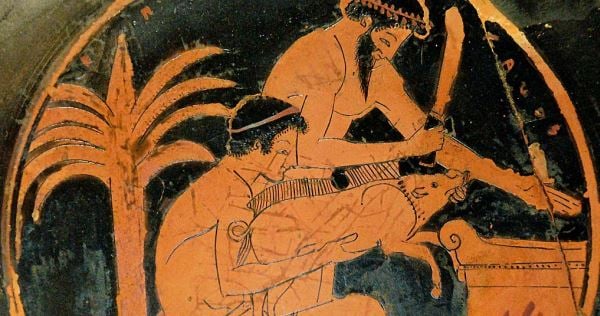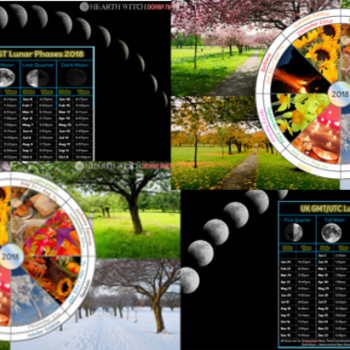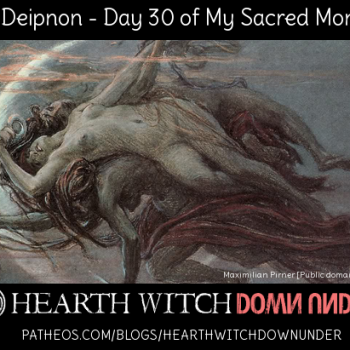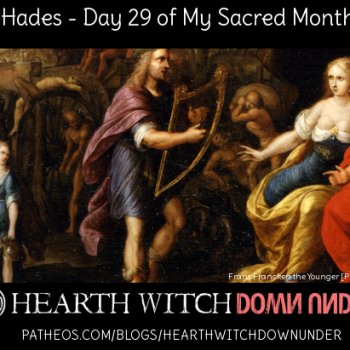Perhaps one of the most contentious issues within the Pagan community is that of animal sacrifice and it is rife with misconceptions and bad ideas.
I came across a post by the Rational Heathen over on Huginns Heathen Hof called “Blood Sacrifices and Other Moronic Things“, a fun title that one – it is basically saying that anyone who participates in ritual sacrifice is a moron. That’s nice. But what was written in the post just reminded me of what so many Pagans and similar seem to think about animal sacrifice, it’s almost always the same objections, over and over. And much of the time, the objections are based on assumptions and those assumptions are often wrong.
I can’t speak of Heathenry at all, but what Heathens write is also read by Pagans of all traditions and taken on board and then applied to all Pagan traditions. So, I feel the need to speak about animal sacrifice and address some of the numerous misconceptions and objections that people raise. I’ll be mostly coming from a Hellenic perspective, as usual.

The Gods Don’t Want Your Sacrifice
The idea here is that the Gods don’t need or want our sacrifices, because They don’t need or want our food. After all, They are the Gods, why would They need our petty human foods? I do agree that They have no need of our food, but want is a different matter. The idea is based on the assumption that the Gods want the food part of the food, rather than something else entirely.
What the Gods really seem to want though is not the sustenance nor even the taste of our food, but the willingness of us to give and to make sacrifices for Them. For the most part this a matter of Kharis – reciprocity, give and take. We want something from Them, then we have to be willing to give to Them. It is a matter of building the relationship. It’s also a matter of proving our devotion.
There is another side to it though, it’s not all nice and it’s not all about being friends. Sometimes the Gods just want what we have because They don’t want us to have it. Zeus is the example here, He demands we give the best portion of our foods, our sacrifices and Prometheus asks Him to decide what the best portion is. Zeus knows that Prometheus is up to some kind of trickery, that’s what Prometheus does. But Zeus thinks the trick will be on us, on humans. He wants us to get the short end of the stick. So, sometimes, our offerings and sacrifices are simply for Their pleasure.
In the end it doesn’t even matter why, it simply matters that They have asked and demanded sacrifices be made. If They didn’t want animal sacrifice, why did They ask for it? Maybe it’s best to not speak for the Gods when They have already spoken for Themselves.
It’s Inhumane
This is probably the biggest concern when it comes to animal sacrifice, that it is somehow inhumane and a horrible, terrifying, torturous experience for the animal. I have to ask though, compared to what? Compared to the slaughter houses and factory farms we rely on for our usual animal products?
In ancient Hellenism, the act of animal sacrifice was very specific. The animal must be unblemished, not mistreated at all, not scared. It is enticed to the altar with food so it actually goes there on its own. It is treated gently. If it bucks away, if it fights, if it runs, if it shows any signs of unwillingness – it is not sacrificed because it is the wrong animal! If it shows no unwillingness, then we must assume the animal is not scared in any way – if it were, it would show it and it would not be sacrificed.
The animal is killed quickly, a swift slice to the throat, it bleeds out. Surely, the death is not entirely painless, it is not fun for the animal. No one would say that. But it’s also nothing compared to what is done to our food stock. This is true for a lot of religions that practice animal sacrifice – it is, usually, done in a way that is more humane than what is done to our food.
And the animals that should be used, should be raised for the purpose or at least raised in a way that is deemed fit by the religion. In Hellenism, ideally, we should either raise the animals ourselves or know how the animals are raised. If they are treated badly in their life, they aren’t actually fit for ritual purposes. This is why many of us suggest not using bought, pre-cut meat in ritual offerings – because like as not, the animal that provided that meat was not in any way suitable for sacrifice and so is not suitable for offerings.
It’s a Waste
This one drives a few of us insane, the idea that what we offer – in animal sacrifice and in non-animal offerings – is a waste of food! And, of course, a waste of money and effort and time and…. Whatever.
Well, if you think it’s a waste to give to your Gods, then I have to wonder why you’re part of whatever religion you are part of. What exactly do you do for your religion? Just, believe in things and take no action? If so, fine, keep it up. And if you don’t believe in or worship the Gods, that’s fine too. But don’t presume to have a say in how the rest of us do things.
For those of us who make food offerings, whether animal or not, it isn’t a waste. Even if the food is burnt to ashes or buried in the ground, it is not a waste from our perspective, because giving to the Gods is not waste – it’s worthwhile. If it’s worthwhile, it’s not a waste.
Furthermore, for the Ouranic deities, we are supposed to eat the majority of what we sacrifice anyway. When an animal sacrifice is made, we offer a portion to the Gods – that portion Prometheus tricked Zeus into agreeing to – and we humans eat the rest or use the rest as we deem fit. It’s kind of like having dinner with the Gods. While we cannot partake of the portion we actually give to Them, we are not usually just killing an animal and burning it to nothingness. We are, usually, getting something from it as well.
Chthonic sacrifices are different, we don’t eat from those at all. And so I too can see the hesitance here, both financially and on the part of the animal. I can understand why people feel like killing an animal and doing nothing of a physical nature to use that animal, other than burning or burying it, does seem like a waste on the surface. But, this is religion, the surface isn’t all there is. Financially, if you can afford it, then it shouldn’t matter – if you can’t afford it, you aren’t expected to do it anyway!
It’s Not Really a Sacrifice
It’s a bit funny, on the one hand people say it’s a waste of money to buy or raise an animal just to slaughter it for… food and offerings. But on the other hand, they say that the sacrifice of an animal isn’t really a sacrifice because we haven’t really invested anything into it except money. Uh, pick just one maybe.
If you raise the animal yourself, you will have invested money, time, energy and perhaps even some of your sanity (stress is hard) into raising the animal. If you have bought the animal, you will be investing money into it – and for most of us, we aren’t rich, at all! Really, sometimes, buying an extra clove of garlic specifically for rituals is kind of costly for some of us and a hard choice to make. Because, maybe I could be buying an apple for the kids instead. And to get money, most people have to work, hard, to earn that money. So there is again time, energy and more invested into that animal.
It should also be pointed out, that if you aren’t a heartless monster or a psycho who enjoys killing animals then the very act of the sacrifice itself is going to be a sacrifice for you too. Taking a life isn’t easy, emotionally and mentally speaking. It’s hard, even when it’s for food and survival – it is still hard. You don’t really want to do the killing. Forcing yourself to do it is a sacrifice you are making. It might be a sacrifice of your morals, your emotional health, your mental health – even if all only temporarily. And it’s something you probably won’t ever forget.
People might like to talk about how the small mental and emotional sacrifice you make as the human is hardly comparable to the animal sacrificing its life – and that is true. But that’s not the point here, because it isn’t about comparison, who has it harder, it’s just about what is.
It’s 2016!
This response to a plethora of things is getting a bit old. The year we live in has little to do with anything. Yes, we have advanced in some areas compared to the various societies thousands of years ago – science and medicine for the most part, also in certain moralistic issues and human rights issues. But we’re not that bloody special either.
It’s 2016 and the way we raise and slaughter animals for food would have the ancient peoples thinking we are the worst creatures to exist. Ever. We are the bad guys in this, we have devolved, we are deplorable, we are the barbarians. Don’t go thinking otherwise, we have no moral high ground here.
The way the ancient peoples (always depending on where you are looking) treated animals compared to how we treat them, if I were an animal and had a choice – I would choose ancient ritual sacrifice instead of modern enlightened factory farming. Thank you very much.
It’s 2016. How nice for us. I’m sure the animal kingdom is grateful for the year we are in.
It’s Just Wrong!
If you eat meat, you really can’t say this. Because all you’re really saying is, “I am a hypocrite”. It’s like those people who get so outraged that some countries eat dogs. Uh, how is that so different to that beef steak on your plate? Just because it’s an animal that you and your society generally associates with love and play, as a pet, that doesn’t mean anything in the grand scheme of things. Cows are sacred in some places, we’re pretty outrageous ourselves for eating them, aren’t we?
Of course if you are a vegetarian or Vegan for moral reasons then this is quite a different story. You will be against the practice of killing animals for any reasons, so of course sacrifice is also wrong in your eyes. I’m not writing this post for you though.
To Be a True Polytheist, You Must Sacrifice
This point is a turnabout from the others, in that it is in defence of not doing sacrifice at all. Some of those who are advocates of, or supporters of animal sacrifice for religion, are also of the opinion that in order for our religions to be true and real, we must practice animal sacrifice. But that’s not really true is it?
I won’t go too deep into this, but suffice to say, some of the ancient writers we use to source our reconstruction or revival of Hellenism were in point of fact rabidly anti-sacrifice. The Hellenic tradition of Orphism is an anti-sacrifice tradition – because Orpheus and his disciples were anti-sacrifice. They instead use tokens, fake animals, to sacrifice.
The Gods may ask us to sacrifice animals to Them, but They also do not ask it of everyone. Not only is it not required in certain traditions, but the ancient Hellenes would have someone who knew how to sacrifice an animal actually perform the sacrifice, it shouldn’t be done by any random person. If you don’t know how to do it, if you are incapable of doing it – physically, financially or otherwise – then you are not expected to do it.
The Gods ask for our best, but They don’t ask for what we don’t have. And if They do, there isn’t much we can do about it anyway. Only the Gods can say what They want from you, as an individual and as a member of a specific religion or tradition. It’s not up to me what you must do, it is not up to any other Pagan, Polytheist, Heathen or whatever. It is up to the Gods and you, and that is all.
And that goes both ways. I can’t tell you what to do in your religion. But you can’t tell me what to do in mine either.
















